Eurisy Members’ Corner: Focus on the UK Space Agency and how it helps to catalyse investment to support the growth of the UK space sector
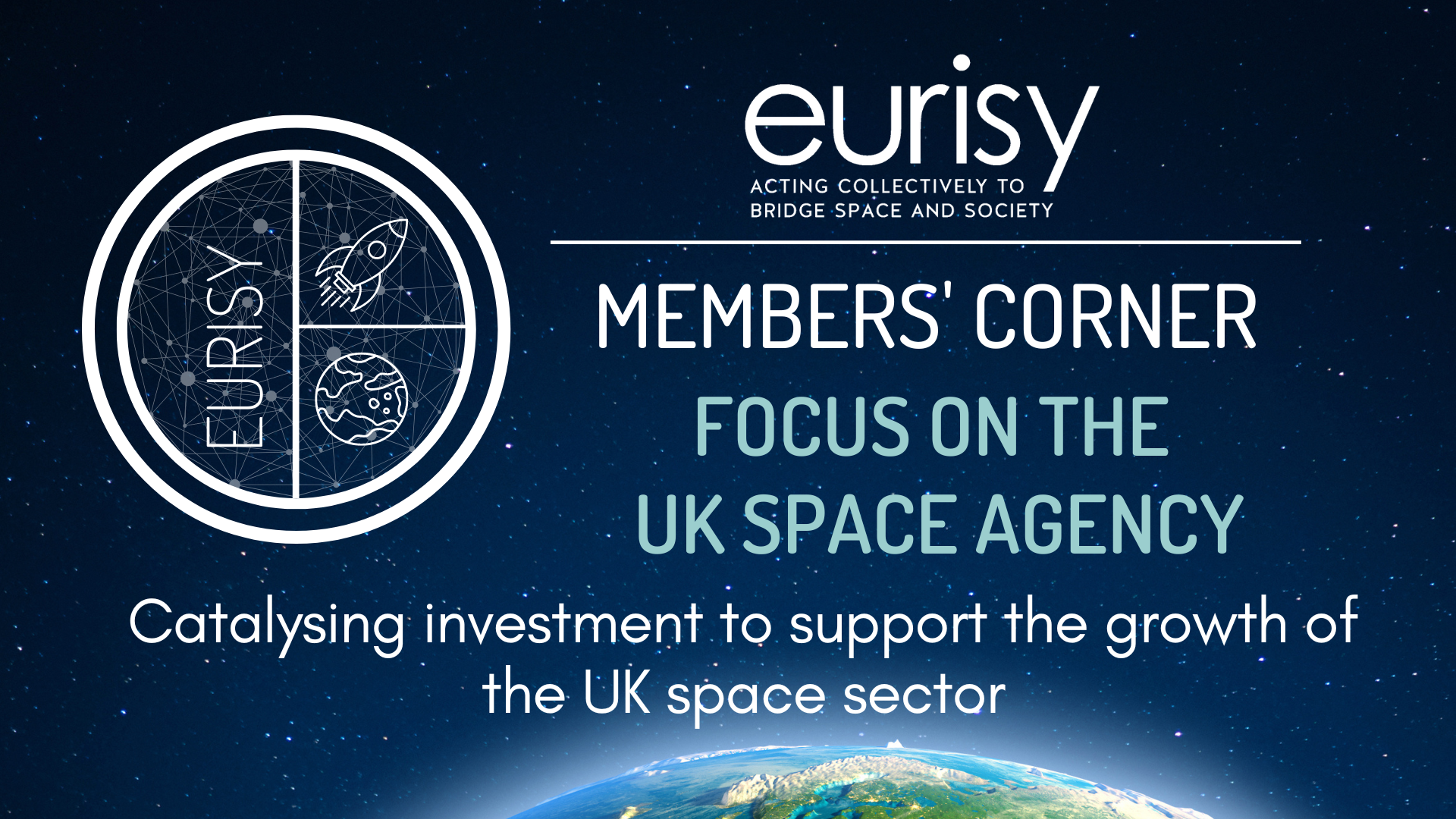
This third episode of the Eurisy Members’ Corner series of 2023 was designed by Ms. Heather Britton (Head of Space Applications and Data, UKSA), Mr. Jon Hulks (Space Ecosystem Development Manager, UKSA) and Dr. William Lovegrove (Head of the Technology Transfer Office, University of Surrey) with the support of Eurisy. This chapter focused on the UK Space Agency and how it helps to catalyse investment to support the growth of the UK space sector. The Applications and Local Growth Teams highlighted some of their work in this area including the opportunities offered by the ESA BASS programme and the partnerships with various national and international institutions.
Ms. Heather Britton in her presentation highlighted the 3 core strategic lines for the UKSA action:
- Catalysing investment – by developing funding and resources to multiply the value of non-government contracts and private capital secured by UK space organisations and maximise the space sectors long-term growth;
- Delivering space capabilities and missions – independently and in partnership with others that use space science, technology and applications to meet national needs to help humanity to understand our universe;
- Championing space – encouraging other sectors to use space science, technology and applications to deliver better services, tackle the climate emergency, inspire STEM education and lifelong learning and advocate for sustainable space activities
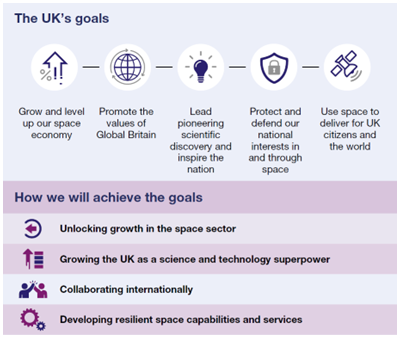
According to the Size & Health of the UK Space Industry 2022 report, 75% of the UK space sector’s income in 2020-2021 was delivered by applications. In order to ensure further growth, UKSA works with private companies in sectors right across the spectrum, including but not limited to:
- Healthcare
- Transport
- Tourism
- Agriculture
- Maritime
- Aviation
The main objective is to exploit space data to bring socio-economic benefit to the UK, its citizens, but to also promote UK capabilities across the globe. The interconnectivity of space applications in the above-mentioned domains should be closely studied and understood.
Through the ESA BASS programme, UKSA aims to achieve its mission which lies in contributing to the growth and expansion of the UK’s space applications industry, generating new value to the economy across the regions, creating jobs and consolidating a global footprint as one Global Britain.
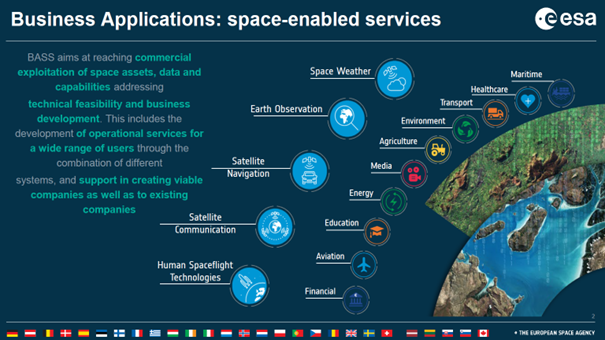
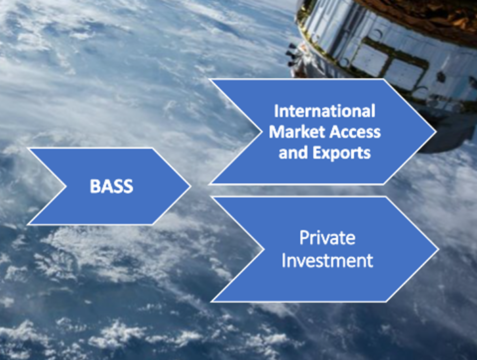
Mr. Jon Hulks, Space Ecosystem Development Manager at the UKSA, underlined that the agency is looking to spread of capabilities, investment and space employment across the whole UK and building a vibrant national space ecosystem. The UK’s National Space Strategy committed to more international collaboration, growing the UK as the science and technology power, developing resilient space capabilities and services by unlocking growth in the space sector. To achieve these goals, the UK Space Agency is investing to build a national space ecosystem through a set of actions:
- Locally led, high impact projects that unlock a new market or address a regional barrier to growth.
- Strengthening local Space Clusters to provide support and advice to space organisations, create local networks, identify common opportunities, and represent the area nationally and internationally.
- Expanding the UK Space Agency Accelerator to give space start-ups the tools they need to grow.
- Developing space R&D infrastructure through the Space Cluster Infrastructure Fund.
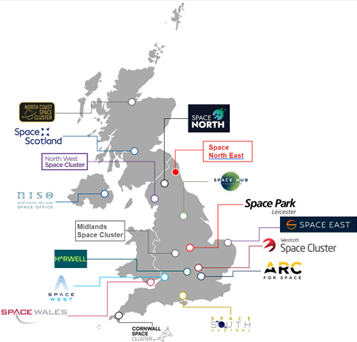
The UK is home for a world-leading university sector, such as Universities of Bath, Bristol, Cardiff, Exeter, Southampton and Surrey, which incubates innovative start-ups by providing technical courses, but also business management curricula to support the establishment and scale-up of those start-ups. However more can be done to ensure that they develop into larger businesses which are based in the UK and offer economic benefits such as sustainable, long-term jobs and export opportunities. By taking a holistic approach, the UK is aiming at ensuring a convergence between universities and start-ups to strengthen the already existing connection. The UK will also require a significant increase of the private sector investments into space activities, coupled with combined efforts of every participant in the UK space economy, from businesses to innovators, entrepreneurs, and space scientists.
Dr. William Lovegrove, Director of Innovation Strategy at the University of Surrey, introduced the Space South Central Cluster, the largest regional space cluster in the UK, and plans for future collaborations with the UK Space Agency.
The Space South Central Cluster is one of Largest regional Space Cluster by revenue
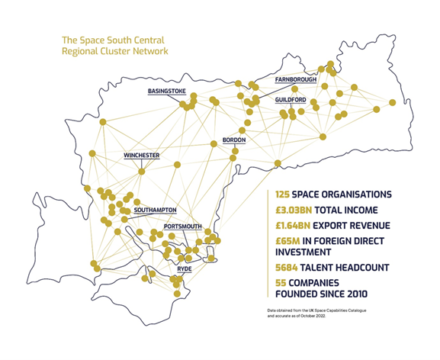
It coordinates support for start-ups and early-stage SMEs via existing business incubation support programmes including SETsquared and new Space ICURe. It inspires and engages more SMEs by nurturing start-up innovation culture and by providing structured programmes. The cluster addresses major skills shortfall via closer coordination of existing higher education and further education institutions and industry skills initiatives. Apart from it, the cluster offers unique and significant training provision to build on, such as continued professional development and apprenticeship programmes.
During Q&A session the participants and attendees were provided with the floor to better understand how they could harness the presented opportunities.
The video recording of the webinar is available under this link.
